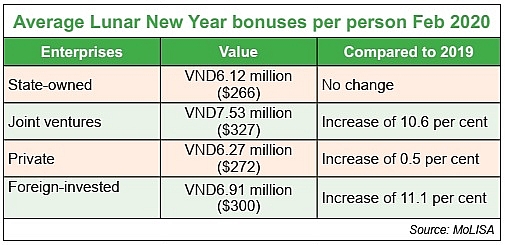Companies scramble to ensure Lunar New Year pay bonuses
 |
| Some businesses have had to hold off on announcing Lunar New Year bonus details until the last minute. Photo: Le Toan |
With only three weeks until Lunar New Year, Nguyen Thi Trang and many other employees at Vietnam Airport Ground Services Co., Ltd. have yet to receive the company’s notice about their holiday bonus. She said that on January 1 she did not receive the same new year bonus as usual, but was advanced January’s salary instead.
“Because of the difficult business situation in the past year, we all know that the company’s Lunar New Year bonus is not guaranteed. Even monthly salaries have only been returned to their original level a few months ago. But since we’ve worked for the whole year, we’re all just looking forward to receiving a bonus, no matter how much it is,” said Trang.
As one of the industries most affected by the pandemic, many textile and garment enterprises have had to let go of thousands of workers and reduce working hours for tens of thousands of others since orders remained limited or were cancelled entirely.
However, some companies have managed to get through the hard times by switching production lines and cutting costs for benefits to take care of employees.
Tran Thi Ha Binh, senior director of Human Resources at Bowker Garments Co., Ltd. said that, though business activities were negatively affected last year, her company was determined to support employees in the New Year, and that they can be assured of a long-term commitment to the business.
According to Hanoi’s Department of Labour, Invalids and Social Affairs, a quick report from 325 businesses operating in Hanoi shows that the average Lunar New Year bonus this year amounts to VND3.8 million ($165), with the highest counting VND30 million ($1,300) and the lowest bonus VND650,000 ($28).
Among foreign-invested enterprises, the Lunar New Year bonus averaged at VND4.45 million ($195), with the highest being VND280 million ($12,000) and the lowest VND750,000 ($32).
 |
Balancing expenditures
Chu Tien Dung, chairman of the Ho Chi Minh City Union of Business Associations, said that mobilising businesses to pay bonuses for employees is also a concern for many associations and businesses.
“We see that most businesses are determined to ensure that Lunar New Year salaries and bonuses are paid for employees. Our association also promotes programmes to take care of workers,” Dung explained.
Le Quang Long, deputy head of Hanoi Industrial, Export and Processing Zones Management Authority, reaffirmed that in previous years many businesses announced Lunar New Year bonuses for their employees and workers. However, this year, due to the impact of the coronavirus pandemic, many have to balance their revenues and expenditures.
Some businesses also said that despite their best efforts, it remains difficult to give out Lunar New Year bonuses. Representatives of Vietnam Airlines said that the company has cut employees’ salaries and bonuses throughout 2020. With the prolonged difficulties, it is expected that Vietnam Airlines workers will not receive bonuses this year.
According to Le Cong Hung, chairman of the Hanoi Taxi Association, as traditional taxis were already struggling to compete with ride-hailers, the pandemic has caused more of them to reduce the number of active cars, with revenue decreasing by 60-70 per cent on-year. “Employees’ salaries had to be paid late, and we didn’t even think about Lunar New Year bonuses,” Hung said.
No overview yet
In order to support and supervise the implementation of the Labour Code, the Ministry of Labour, Invalids and Social Affairs (MoLISA) requested localities to report their numbers for salaries and New Year bonuses.
Although these are due for more than three weeks, the ministry only received reports from some 30 localities, most of them industrial zones and mountainous provinces, so the ministry lacks the data to present an overall picture of wages and bonuses for the whole country. It is expected that by the end of January, the ministry will have completed general information about the situation for the entire country.
Through their connections to grassroots trade unions, the Vietnam General Confederation of Labour said that most businesses that could secure their workers’ position will also maintain Lunar New Year bonuses worth at least one month of salary.
“We realise that giving these bonuses this year will be much more difficult compared to previous years, and the possibility of getting even higher bonuses is almost entirely ruled out,” said Ho Thi Kim Ngan, deputy head of the Department of Industrial Relations under the confederation.
According to the new regulations in the Labour Code 2019, which officially became effective from January, enterprises are not required to give bonuses if the business situation is difficult or if in-kind rewards can be used instead.
Therefore, some enterprises in the service, hotel, tourism, and transport sectors are trying to ensure Lunar New Year bonuses for employees, but not in cash.
Hoang Nhan Chinh, general secretary of the Vietnam Tourism Advisory Board said, “The impact of the pandemic has cost travel companies so much money that they are unable to pay Lunar New Year bonuses for employees. Thus, some of them will offer vacation vouchers instead.”
Although the business situation is difficult, most businesses consider Lunar New Year bonuses a beautiful tradition worth keeping to motivate employees and increase the connection between them and the business.
Some industries with stable growth, which were not affected as much by the pandemic such as technology companies, maintained a good bonus rate, but their numbers are still limited.
Pham Thi Bich Hai, president of the Trade Union of Toto Vietnam Co., Ltd., shared that the company’s bonus this year remains the same as in 2020, so many of the firm’s employees are happy.
| Pham Xuan Hong - Chairman, Ho Chi Minh City Association of Garments, Textiles, Embroidery, and Knitting
Despite sluggish export performance, textile and garment firms have kept Lunar New Year bonuses to ensure the legitimate rights and interests of employees during the upcoming holidays. Last year was a challenging one for many businesses, forcing them to do their best to survive. Among them, the businesses in the textile and garment industry were hit especially hard by the COVID-19 pandemic. However, as the Lunar New Year approaches, all businesses are determined to keep the tradition of granting bonuses for workers. This reflects the wholehearted support of businesses to workers as many of them rely on the valuable salaries to sail through tough times. Despite the challenges, very few companies in this sector have laid off workers in the midst of the global health crisis because they also need the workforce to recover from the pandemic. To prepare for arranging bonus payments, many businesses have ventured into producing face masks and medical clothes to cushion operational losses. Although the pandemic continues to plague key export markets like the EU and US, there is still demand for apparel in such markets. It is forecast that there will a slight improvement in Vietnam’s textile and garment orders this year and, in the first quarter, Vietnamese businesses still have orders from foreign buyers. Some businesses expect better business activities for this year in general, so they need to maintain the existing workforce or even recruit more in the future. Therefore, Lunar New Year bonuses can be an effective tool for them to retain workers. In general, most textile and garment companies will grant approximately one-month salary to workers to prepare for the festive holiday. Some companies with better business results will offer a bonus of up to one-and-a-half month’s salary. These bonuses are necessary to take care of the material and spiritual life of workers, thereby fostering greater loyalty to their companies. Tran Duy Nhat - Director, JAT Autoparts and Industrial Equipment Production JSC
Maintaining bonus payments for the upcoming Lunar New Year is part of JAT’s effort to offset labourers’ difficulties caused by the COVID-19 pandemic, while simultaneously maintaining employee morale. When the pandemic broke out, the company had to suspend operations for a short time and order transportation overseas was delayed too. As a result, labourers had to work on alternate shifts, and enterprises had to ensure safety and security. At JAT, staff members had their incomes lowered, but the company made an effort to maintain an alternate working policy instead of laying off workers altogether. It is lucky that the full lockdown only lasted for a short time. The company’s operation soon recovered and orders exported to overseas went smoothly afterwards. Maintaining a bonus on special occasions, including Lunar New Year, is an important policy. Employees look forward to this bonus to bring to their hometown or add to their savings. Employees are gifted bonuses that can greatly fluctuate in value – from the equivalent of a month’s salary to an employee’s annual salary – dependent on the firm’s performance the year prior. In general, a bonus of an extra month’s salary has been the standard in Vietnam. Labourers in numerous companies have been striking in protest over unpaid Lunar New Year bonuses traditionally awarded to staff in line with the holidays. If strikes last for a long time, they will impact the company’s prestige in the eyes of partners. In addition, workers quitting due to being unhappy with a low bonus or lack of bonus will also impact the company’s operations because it is difficult to recruit new employees in the days before and after the holiday. We applied a bonus policy for staff similar to the previous year’s policy. We built the plan for Lunar New Year based on reference to the bonus level of enterprises in the mechanical sector and other sectors. JAT’s payment is equal to others’ policy in the same sector and much higher than almost all of the businesses working in leather shoes, garments, and textiles. This is part of the reason why so many employees have stuck with us for more than a decade. |
What the stars mean:
★ Poor ★ ★ Promising ★★★ Good ★★★★ Very good ★★★★★ Exceptional
Related Contents
Latest News
More News
- VNPAY and NAPAS deepen cooperation on digital payments (February 11, 2026 | 18:21)
- Vietnam financial markets on the rise amid tailwinds (February 11, 2026 | 11:41)
- New tax incentives to benefit startups and SMEs (February 09, 2026 | 17:27)
- VIFC launches aviation finance hub to tap regional market growth (February 06, 2026 | 13:27)
- Vietnam records solid FDI performance in January (February 05, 2026 | 17:11)
- Manufacturing growth remains solid in early 2026 (February 02, 2026 | 15:28)
- EU and Vietnam elevate relations to a comprehensive strategic partnership (January 29, 2026 | 15:22)
- Vietnam to lead trade growth in ASEAN (January 29, 2026 | 15:08)
- Japanese business outlook in Vietnam turns more optimistic (January 28, 2026 | 09:54)
- Foreign leaders extend congratulations to Party General Secretary To Lam (January 25, 2026 | 10:01)



 Tag:
Tag:




















 Mobile Version
Mobile Version